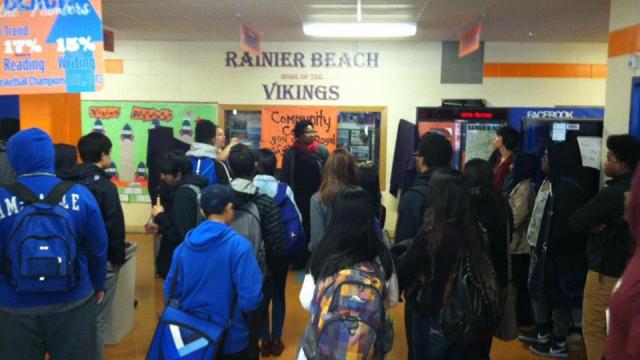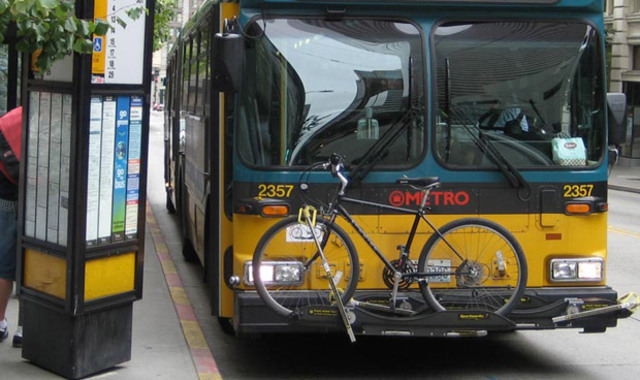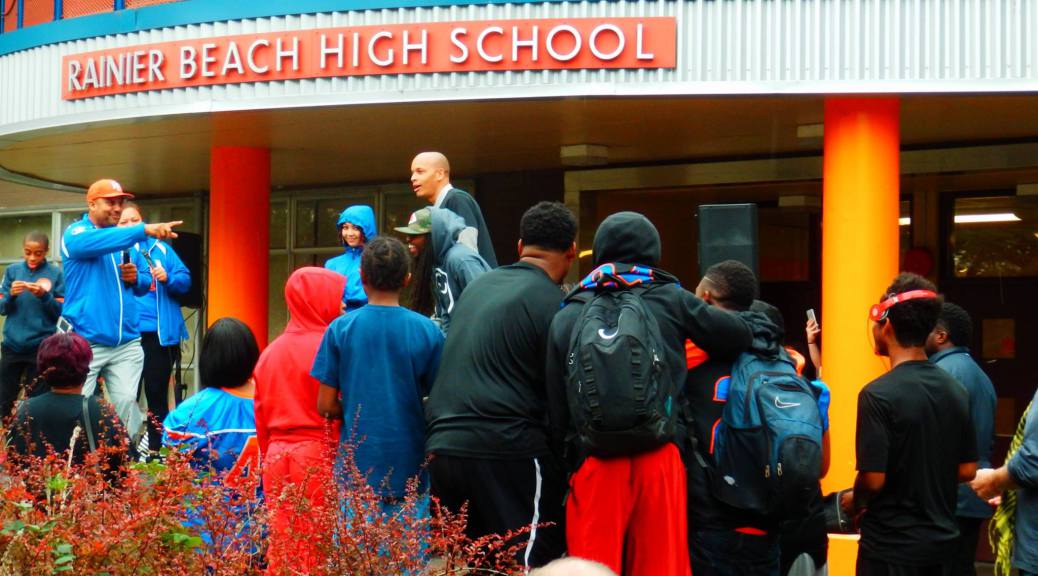
Rainier Beach High School is located in South Seattle. It’s a school that is predominately students of color and with 95% come from low income families. It once had one of the worst reputations in the state. But after changes in administration and staff, Rainier Beach is now leading the district in graduation rates and ranks in the top 5% of the state in reading and math. And that’s not the only thing they are leading on.
Last summer, 120 students of color from Rainier Beach marched in Seattle's streets to demand transportation justice. Five months later, the students convinced Seattle's City Council to unanimously pass an initiative to fund free bus passes for all Seattle public school students. Now, the group is leading the community and the entire Seattle Public Schools district in a movement for progressive change.
I am a senior at Rainier Beach and the student body president. I was a part of the change my fellow classmates were demanding, and I've seen this story unfold first-hand. The reason this bus transit issue mattered so much to me and others is because it affects us all directly – in our pockets, and our parents' pockets. Since my student community called for change, we have helped thousands of families in the Seattle district.
One of the student leaders for the initiative was Ifrah Abshir, a fellow senior at Rainier Beach who helped bring AP computer science to our school, opening a platform for students to learn about the tech industry. Ifrah has been a crucial advocate for transportation justice, fighting against the inequality that has been ongoing at our school and others.
The case for transportation justice
Seattle Public Schools it the biggest district in Washington State, with 53,000 students enrolled. The district made headlines last September when teachers here went on strike. The school district is criticized for a lot of things, and recently the main conflict has been the walk zone policy. The walk zone policy states that all middle and high schoolers who live more than two miles from their school are eligible for a free bus pass. The issue people have with the law is the two-mile range. Two miles is pretty far; speaking from personal experience, I walk to school and live only a mile and half away, and still it's a struggle – especially living in an area that isn't the safest. Many of my fellow students echo that concern.
The other argument is a purely economic one: who can really afford the bus passes? According to Ifrah, "a lot of our families can’t afford lunch, let alone $54 a month for an ORCA card bus pass. So students have to walk up to four miles a day to get to class, or pay their own way. Many of our students (73%) are on free and reduced lunch. If a family can’t afford $1.50 for lunch, how can they afford up to $3 for transportation?”
Many families at Rainier Beach High School fall into this category. Only 50 students of the roughly 630 attending the school are given free bus passes, also known as the ORCA card. It was in this context that our movement was born, since many students were getting tired of not being able to get the card, yet they desperately needed to for economic and safety reasons. They wanted answers as to why the law was like this, and who was really in charge. Ifrah said about the process and what the students found out:
“We’ve asked for student ORCA cards before – we’ve asked lots of times. But we kept getting a run around between Seattle Public Schools and Seattle City Council about whose responsibility it is to subsidize the cost for student transportation. The City officials said it’s the district’s job, the district said it’s the City’s: a blame game that left kids with no transportation.”
This wasn’t the first time our community got such an answer. When it came to Rainier Beach possibly getting shut down, or decisions over school renovation projects, we got the same "run around." This time, the students were fed up and they wanted to see change. So they planned a march to show everyone why the bussing law should be rewritten. The march was held between the school district headquarters and City Hall. The students chose that location because they knew that the people in power, and those who could change the law, resided there.
There was also another reason they chose that location: because the distance between the two was almost the same as the walk zone policy. Students wanted to emphasize how far, and essentially impossible, the two mile range actually is. About 120 students, the city mayor and other officials were in attendance. But while the march was a success, it didn't give students what they wanted. "We didn’t get much action beyond [the march]", said Ifrah, "so we decided to hold a Town Hall event, and that led to a lot more media attention.”
The Town Hall event required even more work and dedication from the students. Ifrah was among whose who led the effort, and said that "to pull it off, we set weekly meeting times at Rainier Beach, got metro bus drivers, lawyers, our local Transit Riders Union, educational activists, and alerted the media. We researched, we discussed, and we came up with a solution-based plan. We created hashtags and flyers, we sent out lots of email invites and created a Facebook page.”
After this long process, the students succeeded in drawing about 200 people to the Town Hall, among them city council members, school board officials and community advocates. There, students affected by the walk zone policy spoke about their experiences. One of them, named Emily, had a story quite different form most kids. Emily told the audience she didn't get free bus passes, so she had to walk to school every day, and one day on her way there, a woman asked her for bus fare at the bus stop. Emily told her she didn't have any, but the woman wouldn't take no. She grabbed Emily's backpack and started digging through it. "I was scared, and I thought people would come to my rescue, but nobody did,” she said.
Emily still wasn’t granted an ORCA card after her experience, so she decided to collect bus tickets. The Seattle Metro system features a different colored bus ticket each day, which rotates every week. Emily managed to get all the different colored tickets and started riding the bus illegally. It was only after the Town Hall event that someone who had heard her story started paying for Emily's ORCA card.
After the Town Hall, students' personal stories and the conflict generated by the walk zone policy became known throughout the city. It also caught the attention of Seattle City Council member Mike O’Brien, who was moved by the students' dedication and helped get them what they deserved. O'Brien made sure the 2016 council budget had the bus passes in it, and in the end $1 million was given to the district to distribute ORCA cards to students across the city. "Without the Rainier Beach students, the investment wouldn’t have happened,” said O’Brien.
But the students at Rainier Beach didn’t just host events and raise awareness about the matter. They also did their research and gave the district specific suggestions on how to further improve the transit issue.
1. Immediately double the ORCA card program at Rainier Beach to 100, so it helps the kids in most desperate need of paid transportation.
2. As an interim goal, get ORCA cards for all students who are on free and reduced lunch, which is 73% of the student body.
3. As a long-term goal, change the policy around the state so that students outside the Seattle area also benefit with greater financial access to public transit.
The fight is not finished. The Seattle Public Schools district didn’t take time to fully hear out the students about their proposed plan; it merely changed the walk zone policy from two miles to one. The Rainier Beach students have vowed to continue their fight for change on this issue, and said the protests will escalate if their demands aren't met.
3 WAYS TO SHOW YOUR SUPPORT
- Log in to post comments

















